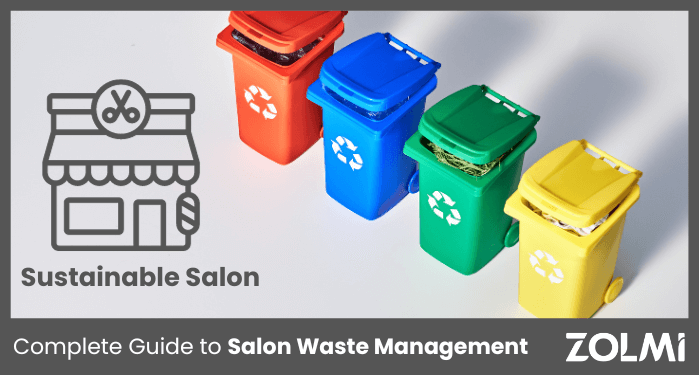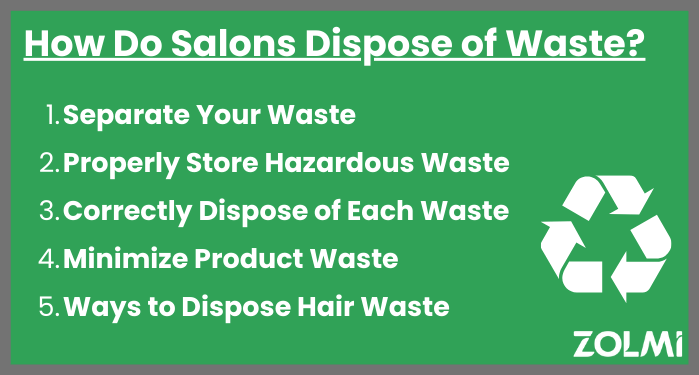Complete Guide to Salon Waste Management in 2024


Proper salon waste management is crucial for avoiding fines and keeping everyone (including the planet) safe.
Remember waste is nothing but extra costs to your business, so it would best to keep it under control and you can get a lot of support in achieving that using salon management software.
Please Note: The laws on proper waste disposal may differ from state to state. This article is meant to provide tips and general guidance. For more detailed information, please check your state or municipal website.
We’ll go over the different kinds of hair salon waste, how to deal with and reduce wastes as well as some different disposal and recycling options and sustainable salon strategies.
Sustainable hair salon waste disposal and efforts to reduce salon waste are especially important in this day and age. Here are some statistics about waste in our business.
Did you know that:
With everyone becoming more environmentally aware and businesses doing their part to reduce their carbon footprints, many beauty professionals are interested in what they can do to create an eco friendly hair salon.
One of the key steps in controlling your salon’s environmental impact is to implement a waste management plan. This should take the different types of wastes into account and work to minimize excess waste.
We also recommend you check out our post on Tips on How to Reduce Salon Expenses.
There are two main kinds of waste generated in the beauty industry: clinical and general. Not all salons produce both, and they need to be handled in different ways.
This is everything that salons produce that doesn’t involve bodily fluids and isn’t potentially sharp or infectious. This can be chemicals used in processing or hair color treatments, plastic containers or paper trash, leftover hair, and garbage from the reception area.
Some of these chemicals can be hazardous, so make sure that you read the health and safety data sheets of each product for detailed instructions on storage and disposal.
For everything else, make sure that your business has recycle bins as well as trash bins and educate yourself and your staff on what you can compost and recycle.
Clinical waste in a salon can be hazardous because it’s basically everything left over from treatments that contains germs and bodily fluids or is potentially sharp and/ or infectious.
Some examples include waxing strips, used masks and PPE, gloves, cotton buds, q-tips, needles or pigmentation pens. It’s important to keep these in specially-marked bins, apart from your regular garbage and put any sharp items into a special box or container.
If you offer clients any services that produce clinical waste, you may need to arrange for a special disposal service. Make sure to check the rules in your state.
You may wonder “What is the importance of disposing salon waste properly?” Apart from the fact that 25 states have now made recycling mandatory, a business should always try to lessen its environmental impact.
When you recycle, save energy and reduce your water consumption, you automatically create a more eco friendly salon. You can also save money by reusing items when it’s safe to do so.
Use different types of salon waste bins (or containers for clinical waste) to make proper disposal easier. Separate your recyclables from your compostable items and actual garbage.
In some areas, you may also need to sort different categories of recyclables, such as paper, metals, glass and plastic.
Make sure to keep hazardous waste far away from clients and train your staff in safe handling.
Keep the safety data sheets for all products (whether they’re hazardous or not) and any first-aid information ready.
How to dispose of chemical waste in a salon depends a lot on your state’s regulations. In general, chemical waste and empty containers need to be kept in a well-ventilated, spark-free area to prevent reactions and avoid property damage or health issues.
Search online for a waste disposal service in your area to arrange for regular pickup.
Also, check out our post on Salon Back Bar Inventory.

Some areas will have a free business and hair salon recycling program, but in other cities it may cost you a fee to join.
Start by consulting local resources- you can access your municipal website and search for specific regulations and legal requirements (remember that it’s mandatory to recycle in some states and you could face a hefty fine if you don’t).
If your goal is to have a green salon, sorting your recyclable items is key. The easier you make this process for your staff (by providing proper training and correctly marked bins, for example), the better.
Carefully measure and mix only what is needed for clients, and make sure to empty bottles completely.
Use reusable materials when possible, such as larger-volume, refillable containers and cloth towels when it’s safe to do so. You can also invest in energy-efficient LED light bulbs (which also have a longer life than incandescents) and low-flow showerheads and toilets to save water.
Hair isn’t considered hazardous or clinical waste, but it could definitely be hazardous to your sinks. Make sure that it goes to general waste, and not down the drain or you’ll be dealing with clogged pipes.
In some cases, hair can even be donated with the client’s permission. Some salons participate in programs that accept donated ponytails to turn into wigs, but these organizations all have specific requirements for what they’re able to accept, so do your research first.
Learn how Salon Inventory Software can help you mange your salon stock more efficiently and therefore reducing your waste.
What can be recycled in a hairdressing salon depends at least in part on what the waste-management facilities in your area can handle. Some cities are able to recover plastic but not glass, for example.
Generally speaking, single use items, packages that didn’t contain hazardous materials, magazines and drinks cans can all go into recycling bins. In some cases, metals such as used foils from hair services can also be taken by a recycling service.
It’s important to always check the packaging (ideally before you order or buy a large volume of a product) to see if your state’s recycling program will cover it.
In an industry as busy as ours, managing the wastes that we produce is more important than ever.
A salon’s owners are key partners in the struggle to reduce cosmetic waste. Make sure to hold meetings about waste management and get your staff on board- you can ask them for ideas, too.
Whether your goal is to run a “green” or eco hair salon, or just to save energy and cut down on the number of garbage bags you produce, properly separating and handling your salon waste is a must.
What a waste: a global review of solid waste management
https://openknowledge.worldbank.org/handle/10986/17388
Hazardous waste management
https://inis.iaea.org/search/search.aspx?orig_q=RN:19106671
Waste and waste management
https://www.annualreviews.org/doi/abs/10.1146/annurev-anthro